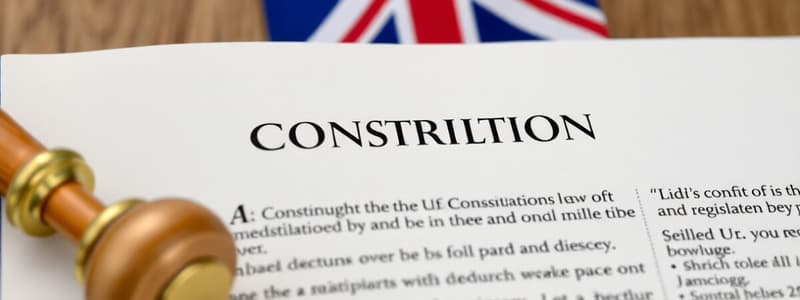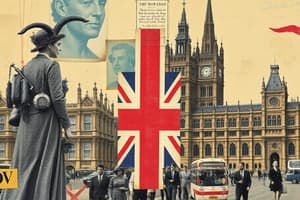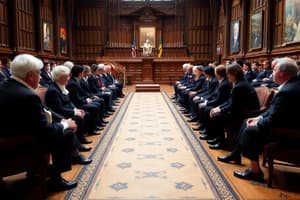Podcast
Questions and Answers
Which of the following is a source of the UK Constitution?
Which of the following is a source of the UK Constitution?
- Legislation (Acts of Parliament) (correct)
- Common law principles
- Judicial regulations
- Administrative guidelines
What does the term 'implied repeal' refer to in constitutional law?
What does the term 'implied repeal' refer to in constitutional law?
- The ability of constitutional statutes to be overridden by ordinary statutes
- The formal repeal of an older law by a newer one
- The situation where a newer law takes precedence without expressly repealing the previous one (correct)
- The simultaneous validity of conflicting laws
Which Act is an example of legislation that pertains to the constitutional allocation of powers?
Which Act is an example of legislation that pertains to the constitutional allocation of powers?
- Education Act 1996
- Scotland Act 1998 (correct)
- Health and Safety at Work Act 1974
- Companies Act 2006
Which of the following statements is true regarding constitutional statutes?
Which of the following statements is true regarding constitutional statutes?
What is NOT considered a source of the UK Constitution?
What is NOT considered a source of the UK Constitution?
Which historical document is a part of the constitutional framework regulating the individual-state relationship?
Which historical document is a part of the constitutional framework regulating the individual-state relationship?
According to AV Dicey, which of the following statements about legislation is true?
According to AV Dicey, which of the following statements about legislation is true?
In the context of UK constitutional law, what is the role of judge-made law?
In the context of UK constitutional law, what is the role of judge-made law?
What distinguishes a constitutional convention from legal rules in the context of political practices?
What distinguishes a constitutional convention from legal rules in the context of political practices?
Which statement accurately reflects the relationship between constitutional conventions and legal constitutionalism in the UK?
Which statement accurately reflects the relationship between constitutional conventions and legal constitutionalism in the UK?
What is the nature of the Royal Assent in the context of UK law and conventions?
What is the nature of the Royal Assent in the context of UK law and conventions?
Which of the following is NOT a characteristic of constitutional conventions?
Which of the following is NOT a characteristic of constitutional conventions?
What criterion is crucial for the appointment of a Prime Minister as per constitutional conventions?
What criterion is crucial for the appointment of a Prime Minister as per constitutional conventions?
What distinguishes a constitutional convention from mere political practice?
What distinguishes a constitutional convention from mere political practice?
Which statement best describes the nature of enforcement concerning constitutional conventions?
Which statement best describes the nature of enforcement concerning constitutional conventions?
According to Adam Tomkins, how is a constitutional convention defined?
According to Adam Tomkins, how is a constitutional convention defined?
What is an example of a consequence of violating a constitutional convention?
What is an example of a consequence of violating a constitutional convention?
How are constitutional conventions characterized regarding their legal status?
How are constitutional conventions characterized regarding their legal status?
Flashcards
Sources of UK Constitution
Sources of UK Constitution
Different places where the rules and principles of the UK constitution are found.
Legislation (Acts of Parliament)
Legislation (Acts of Parliament)
Laws passed by the UK Parliament, forming part of the UK Constitution.
Constitutional Conventions
Constitutional Conventions
Rules of conduct that are not legally binding, but are usually followed.
Judge-made law
Judge-made law
Signup and view all the flashcards
Codified Constitution
Codified Constitution
Signup and view all the flashcards
International Law
International Law
Signup and view all the flashcards
Implied Repeal
Implied Repeal
Signup and view all the flashcards
Constitutional Statute
Constitutional Statute
Signup and view all the flashcards
What are constitutional conventions?
What are constitutional conventions?
Signup and view all the flashcards
How are conventions enforced?
How are conventions enforced?
Signup and view all the flashcards
Ministerial responsibility
Ministerial responsibility
Signup and view all the flashcards
What is a constitutional wrong?
What is a constitutional wrong?
Signup and view all the flashcards
What is the weight of convention?
What is the weight of convention?
Signup and view all the flashcards
Example: Royal Assent
Example: Royal Assent
Signup and view all the flashcards
Appointment of the Prime Minister
Appointment of the Prime Minister
Signup and view all the flashcards
Conventions and Legal Constitutionalism
Conventions and Legal Constitutionalism
Signup and view all the flashcards
Ministerial Code & Cabinet Manual
Ministerial Code & Cabinet Manual
Signup and view all the flashcards
Study Notes
UK Constitution Sources
- Sources are where the rules and principles of a constitution are found
- Codified constitutions are examples, such as the US Constitution or the German Grundgesetz
- UK Constitution has no single codified document
Learning Objectives
- Describe different sources of the UK Constitution
- Explain relationship between different sources of the UK Constitution
Sources of the UK Constitution
- Legislation (Acts of Parliament):
- Often contains constitutional rules
- Not always easy to distinguish codified constitutional elements from other legislation
- Consider whether the law concerns:
- Organizing and allocating powers to institutions (e.g., devolution, separation of powers)
- Relationships between the individual and the state (e.g., Magna Carta, Bill of Rights, Human Rights Act)
- Constitutional conventions: Unwritten rules of conduct that guide the government and political institutions.
- Judge-made law: Laws created through court rulings and interpretations.
- Judicial interpretation: Judges interpret laws, potentially changing their meaning
- Common law: Judges create new law based on best practices in administration
- Procedural fairness, reasonableness
- Constitutional principles (e.g., rule of law)
- Not as binding as statutes
- International law: International treaties influence domestic legal practices.
- Treaties are often enacted into legislation, giving domestic effect.
- If not enacted into legislation, domestic law should interpret itself consistently with international treaties.
Legislation (Further Details)
- Constitutional elements can be found in any Act
- Not all legislation in the UK constitution has the same status; hierarchy exists.
- Acts can be interpreted as ‘constitutional statutes’; their provisions are not easily amended
- Laws LJ: a hierarchy between 'ordinary' vs 'constitutional' statutes
- Normally, the more recent one prevails
- Implied repeal is not applicable to constitutional statutes (Laws LJ)
- UK Supreme Court support this view (Thoburn v Sunderland City Council; R (HS2 Action Alliance) and R (Miller))
Judge-Made Law
- Judges cannot strike down laws, but interpretations can alter meaning significantly.
International Law
- International treaties often affect domestic law
- If not enshrined in domestic law, domestic law should align with the treaty where possible.
Studying That Suits You
Use AI to generate personalized quizzes and flashcards to suit your learning preferences.




